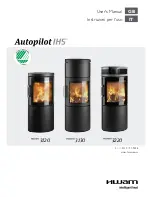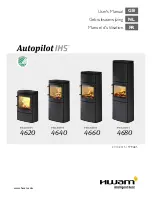
FRAME - QUASIMODO - MODO Airtight
11
A sealed installation does not consume the room’s oxygen because it draws all the air from the outer environment (if suitably
ducted) and makes it possible to install the product in all houses that require a high degree of insulation such as “passive” or “high
energy efficiency” houses. Thanks to this technology there is no risk of smoke emissions in the room and no air inlets - hence not
even the relevant ventilation grilles - are required in the installation premises.
Consequently, there will be more draughts of cold air in the room, thus making it more comfortable and increasing the overall
efficiency of the system. The sealed stove in a sealed installation is compatible with the presence of forced ventilation or premises
that might have negative pressure with respect to the outside.
6.2
MINIMUM DISTANCES
Observe the distances from flammable objects (sofas, furniture, wood panelling, etc..) as specified in the following diagram.
If objects considered to be particularly sensitive to heat are present, such as furniture, curtains or sofas, as a precaution, increase
the stove clearances substantially to avoid possible deterioration due to the effect of heat.
Fig. 11 - Safety distances from combustible material.
.LEGENDA
Fig. 11
dR (rear distance)
200 mm
dS (side distance)
300 mm
dB (lower distance)
15 mm
dC (upper distance)
750 mm
dP (front radiation)
1000 mm
dF (floor radiation)
1000 mm
dL (side radiation)
1000 mm
1
FLOOR
2
FRONT FLAMMABLE MATERIAL
3
AREA SUBJECT TO RADIATION
4
FLOOR GUARD
5
RADIATED SURFACE TO BE PROTECTED
6
REAR/SIDE/UPPER FLAMMABLE SURFACE
If the floor is made of combustible material, use a protection made of non-combustible material (steel, glass...) that also protects
the front from any falling combusted material during cleaning operations.
Always fit a floor guard if the floor is made of flammable material.
Install the stove also detached from any non-combustible walls/surfaces, observing a minimum clearance of
200mm
(back) and
300mm
(side) to allow effective aeration of the appliance and a good distribution of heat in the room.
In any case, ensure adequate distance to facilitate access during cleaning and extraordinary maintenance. If this is not possible, it
must still be possible to distance the product from adjacent walls/elements.
This operation
(1*)
must be performed by a technician qualified to disconnect the combustion product expulsion ducts and their
Summary of Contents for FRAME3
Page 31: ...NOTE ...












































